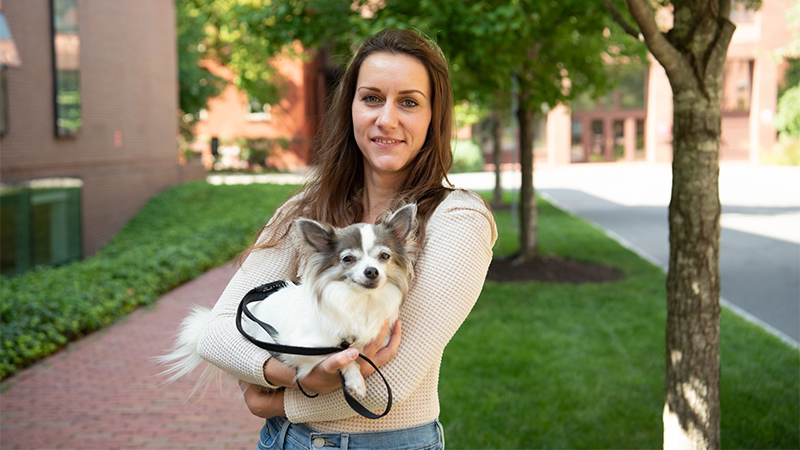I am a neuroscience researcher studying dog brains. Specifically, I focus on how the presence of humans has influenced their brains. I aim to understand how dogs have managed to develop a way to comprehend our language, and how this could help us to better grasp how language emerged and evolved in humans.
Photo by Celia Muto
What are the big questions driving your research?
I am exploring how human language emerged and what makes it unique compared to other forms of communication in the animal kingdom. One way to approach this is by studying a species that has evolved alongside humans for thousands of years: the dog. Through this coevolution, dogs have developed a remarkable ability to understand our language. By comparing the brains of domesticated dogs, who comprehend human language, with those of undomesticated canids, such as foxes or wolves, I believe we can identify specific neural networks related to the emergence and learning of language. This, in turn, could allow us to hypothesize about the development of comparable language networks in humans.
What drew you to this area of neuroscience?
I’ve always been fascinated by the brain. MRI images are impressive and sparked my desire to explore this field more closely. Brain anatomy, neural connections, functions, and associated behaviors are all subjects that intrigue me.
Additionally, animal communication is another aspect that deeply interests me: how animals communicate with each other and how interactions between humans and animals occur.
That’s why I decided to focus on the brain and on an animal species that interacts closely with us. To study human language, the interaction between humans and dogs seemed like an obvious choice to me.
The brains of dogs still have much to teach us.
What is the trait you most admire in others?
I admire people who manage to maintain a good balance between professional life, personal life, social activities, and personal development. It’s a balance I strive to cultivate and achieve every day.
I also admire people who are open-minded and willing to consider different perspectives. In research, it’s crucial not to remain fixed in one’s own ideas but to be interested in the various ways others think, work, and approach things.
What are your hopes for the future?
I would like to return to my home country, France, and secure a position in academic research there. Although the selection processes are very competitive, I am determined to keep working hard to achieve this goal. I hope to continue working on these projects that I’m passionate about and collaborate with the inspiring people I’ve had the opportunity to meet here at Harvard.
What are your hobbies outside of the lab—current, past, or future?
I’m passionate about organizing events, whether it’s hosting gatherings at my home with friends or planning scientific events. I love bringing people together, fostering a sense of unity, and encouraging meaningful exchanges. I’m also passionate about animals and nature, which is reflected in my research focus, and I share my life with a little chihuahua. I’m equally passionate about scuba diving and am practicing underwater photography. Lastly, my greatest passion is cooking and sharing a delicious meal with my entire family.

